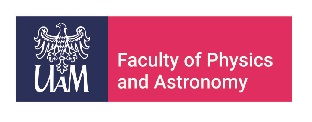Superconductivity in Hybrids of Magnets and Metals
The position in PRELUDIUM BIS-3 project is financed by the National Science Center (NCN) of Poland and supervised by dr hab. Ipsita Mandal from Instytutu Fizyki Jądrowej Polskiej Akademii Nauk (e-mail: ipsita.physics[at]gmail.com) and dr Kacper Wrześniewski (auxiliary supervisor from UAM; e-mail: wrzesniewski[at]amu.edu.pl).
Scholarship for the PhD students is 5000 PLN per month (up to the month of the mid-term evaluation at the doctoral school), and 6000 PLN per month (after the month of the mid-term evaluation at the doctoral school). In addition, there is generous funding available for computers and travel. Preludium Bis 3 will also support international mobility of the PhD student through a foreign fellowship carried out over a period of 6 months.
Requirements to the candidate:
− MSc degree in physics or mathematics;
− Basic knowledge of quantum mechanics and condensed matter
physics / solid state physics;
− English on the level of general communication and that enables
reading of articles;
− Basic knowledge of any programming language like python,
C++, etc.
Short description:
In contemporary experiments, various materials have been identified with relatively high Tc, where spin-excitations (whose quanta are known as magnons) are believed to mediate the electron-electron attraction. Despite some major progress, a detailed understanding of these materials has been elusive due to the complicated lattice structure, strong correlation effects, and other ordering phenomena competing with superconductivity. Thus, we need novel, simpler-to-model, and easy- to-fabricate systems that can host superconductivity. Here, I propose magnet-(thin)metal heterostructures as a promising platform for realizing tunable, magnon-mediated superconductivity, with the potential of achieving high values of Tc. Such hybrids offer crucial advantages by separating the spin-excitations and the electrons into separate layers, allowing for engineering and optimizing the two systems independently. This offers an unprecedented control over the electron-electron attraction and the resulting superconductivity. To unveil the full potential of these hybrids, we will develop the hitherto-missing theoretical understanding of (i) spin-excitations and their propagation for various magnetic states, and (ii) electron-magnon coupling for different interfaces. We will thus show how to control the electron-electron attraction and the resulting Cooper pairing in the metal layer. Besides superconductivity, our investigations will provide crucial insights into spin-excitation transport in various magnetic states, resulting in novel spin-based information processing concepts.

